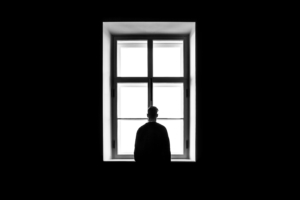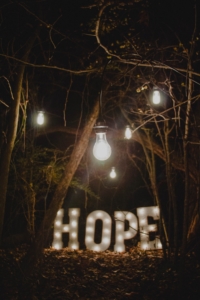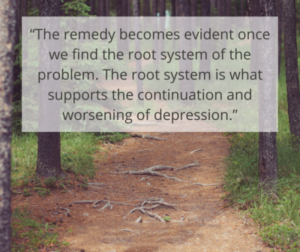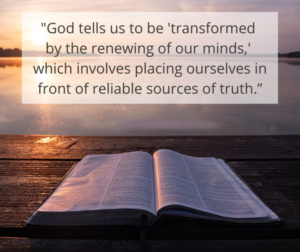Depression Counseling: Combatting Common Myths
A quick search of the Internet finds definitions of depression such as “feelings of severe despondency and dejection.” It seems straightforward at first blush. Digging into the definition, however, we find that depression is more than feelings, and we discover that no two individuals’ experiences of depression are the same. Newport Beach Christian Counseling provides resources and support tailored to individual experiences.
What is depression?
 In general terms, depression is a state of being. “Being,” in this case, is an active experience of the three dimensions of depression, which are feelings, thoughts, and behaviors. Any definition of depression that excludes one or more of these elements is inaccurate and misleading. Depression, then, is an active depressing of our thoughts, feelings, and actions. When something is depressed, it is pressed down.
In general terms, depression is a state of being. “Being,” in this case, is an active experience of the three dimensions of depression, which are feelings, thoughts, and behaviors. Any definition of depression that excludes one or more of these elements is inaccurate and misleading. Depression, then, is an active depressing of our thoughts, feelings, and actions. When something is depressed, it is pressed down.
Signs and Symptoms of Depression
Let’s look at some of the signs and symptoms of depression as identified by the Diagnostic and Statistical Manual of Mental Disorders, 5th edition (or DSM-5 for short).
Sadness or Negative Emotions (Feelings)
- This refers to a depressing mood.
- In other words, one might feel down, blue, apathetic, disinterested, etc. There are a variety of experiences of sadness.
Worthlessness or Guilt (Thoughts)
- These are actually thought patterns that breed a depressed mood.
- For example, a person might think, “I’m just no good to anybody,” or “I’m such a screw-up.”
- These thoughts may lead to a depressed mood state, but they are not feelings, themselves.
Changes in Sleep and Appetite (Behaviors)
- One might sleep to excess or have trouble sleeping. Time spent awake is depressed by sleeping more than is typical or sleep is depressed by spending more time awake.
- A person may eat more or less than usual. Again, appetite or satiety is depressed.
To understand what depression might look like for you, or someone you love, we need to understand how this state of being plays out in every-day life and how there is an intricate interplay between the three dimensions of depression. The symptoms listed above are not exhaustive and represent only a handful of experiences you or a loved one may be experiencing.
What does “depression” look like and how do I identify it?
Experiences of depression vary widely across individuals and even cultures. There is no one-size-fits-all identification process. That’s why it’s so important, in considering depression counseling, to understand that your experience may not reflect what you see on commercials, or of your friends, relatives, or coworkers.
 The question you must ask yourself is, “Is what I am experiencing interfering with my ability to live and enjoy life?” If the answer is yes, depression counseling may be the solution for you. To help you answer this question (for yourself or a loved one), consider the following real-life manifestations of a depressed state of being.
The question you must ask yourself is, “Is what I am experiencing interfering with my ability to live and enjoy life?” If the answer is yes, depression counseling may be the solution for you. To help you answer this question (for yourself or a loved one), consider the following real-life manifestations of a depressed state of being.
As you review them, do they resonate with you? Can you relate to them? Do you see these things happening in the life of a loved one? (Please note these experiences are not listed in order of importance, nor is this list comprehensive.)
- It seems every morning is a struggle. You love to hit the snooze button. You don’t want to get out of bed.
- Your body isn’t cooperating with you. You’re tired all the time. You feel fatigued. You may even have unexplained aches and pains.
- You have trouble concentrating. Your attention is easily interrupted. Trying to do something simple requires so much effort. You may even do mindless things like putting the milk in the cabinet or your keys in the freezer.
- You feel sad. You cry a lot. You are constantly aware that you’re putting on a mask of happiness.
- Food has lost its flavor to you. You used to find comfort in a gooey pizza or greasy hamburger, but now you even feel too tired to chew much of the time.
- You remember how you used to love to see the next box office hit at the theatre. It seems overwhelming, now, to even think about getting ready, leaving the house, and being around people to do this thing you once regularly enjoyed.
- You don’t know how you feel, so when people ask you if you’re “okay,” you just don’t know how to respond. You usually say, “I’m fine,” because you can’t seem to put your finger on a specific feeling.
- You question yourself about why you’re feeling down. You think about all the things you have in life, and by all outward appearances, you should be feeling happy, but you don’t, and thoughts of guilt invite even more feelings of sadness.
- You’ve wondered what it would be like to run away from it all. To just disappear. You haven’t thought about killing yourself necessarily, but you think about how nice it would be to just escape or sleep forever.
- Things at work and at home are getting overlooked. Even though you know there are tasks you must complete, you just can’t seem to get them done. And, now, people are noticing.
If even a few of these scenarios resonate with you, you should seek depression counseling. Despite campaigns of mental health awareness, there continue to be stigmas associated with seeking help. What we know is that avoiding seeking help yields more intense experiences of depression that can quickly spiral out of control. It is never too early to engage in depression counseling, and there is no experience too small to benefit from it.
Combatting the Myths of Depression Counseling
 Severe experiences of depression are avoidable. We are beings crafted for connection. When we begin to feel sad, we sometimes isolate ourselves particularly from those who love us the most. We fear judgment from others, and most of us consider therapy or counseling a last resort because of the following myths and false beliefs. Have any of these thoughts prevented you from seeking depression counseling?
Severe experiences of depression are avoidable. We are beings crafted for connection. When we begin to feel sad, we sometimes isolate ourselves particularly from those who love us the most. We fear judgment from others, and most of us consider therapy or counseling a last resort because of the following myths and false beliefs. Have any of these thoughts prevented you from seeking depression counseling?
If I go to talk to a counselor and I use the word depression, they’re going to diagnose me.
Your experience of depression may or may not necessitate a diagnosis. What is of primary importance to you and your counselor is to understand the experiences you’re having, and how you can work together to minimize or eliminate the depressing thoughts, feelings, and behaviors in your daily life.
Be candid and express your concern about being diagnosed. Above all, be 100% honest about your experiences. Counseling is a nonjudgmental space for you to capitalize on transparency for recovery and restoration.
My therapist will recommend I take medication for depression.
You are your number one advocate. If you do not want to consider medication, you must express that clearly and immediately. Also, most counselors and therapists are trained in talk therapy.
Helping you work through your challenges by talking about them and setting goals is their expertise. Conversely, if your goal is to obtain medication a counselor can help you determine the advantages and drawbacks of doing so before you seek psychiatric consultation.
Others will think I’m crazy.
Your counseling experience is yours to share with whomever you choose, or with no one. Your counselor will help you explore the false belief that everyone who seeks counseling must be “crazy.”
Rather than focusing on what others will think of you, consider how badly you want things in your life to improve. What are you willing to do (e.g. – seek counseling for depression) to alleviate your sadness and reincorporate joy into your daily life?
It’s really not that big of a deal. I should be able to deal with this on my own.
 You were not designed to live life, do life, and cope with life on your own. Look back to the beginning. God created Eve to give Adam a companion. God knew it was not good for a person to be alone, or to walk through life’s mountains and valleys alone.
You were not designed to live life, do life, and cope with life on your own. Look back to the beginning. God created Eve to give Adam a companion. God knew it was not good for a person to be alone, or to walk through life’s mountains and valleys alone.
You are not intended to be alone. God provided therapists, pastoral teams, and Christian counselors with the wisdom needed to walk alongside people just like you. If it’s a big deal to you, it’s a big deal. Do not delay seeking wise counsel.
Getting Started with Depression Counseling
If you are experiencing even the slightest changes in mood, thought, and behavior, Newport Beach Christian Counseling is a good place to unpack those experiences and gain the wisdom of a trained professional. Your experiences of depression do not have to define you.
You have the power to overcome depression. Your experiences aren’t too small or too big to start with counseling. Understanding how various the signs and symptoms of depression are across all people, you free yourself from stigma and help others do the same.
“Alone”, Courtesy of Anthony Tran, Unsplash.com, CC0 License; “Inside Looking Out”, Courtesy of Sasha Freemind, Unsplash.com, CC0 License; “Hope”, Courtesy of Ron Smith, Unsplash.com, CC0 License; “Lonely Road”, Courtesy of John Towner, Unsplash.com, CC0 License

 There are a variety of causes of depression and reasons why people become depressed. A mixture of genetics, brain chemistry, and family history each play a role in developing depression. Certain individuals may have a biological predisposition for developing mood issues when faced with overwhelming stressors.
There are a variety of causes of depression and reasons why people become depressed. A mixture of genetics, brain chemistry, and family history each play a role in developing depression. Certain individuals may have a biological predisposition for developing mood issues when faced with overwhelming stressors. There is a wide range of assorted symptoms involved in each individual experience of depression. Each person will have a different combination of symptoms which fit one or more types or patterns of depressions.
There is a wide range of assorted symptoms involved in each individual experience of depression. Each person will have a different combination of symptoms which fit one or more types or patterns of depressions.
